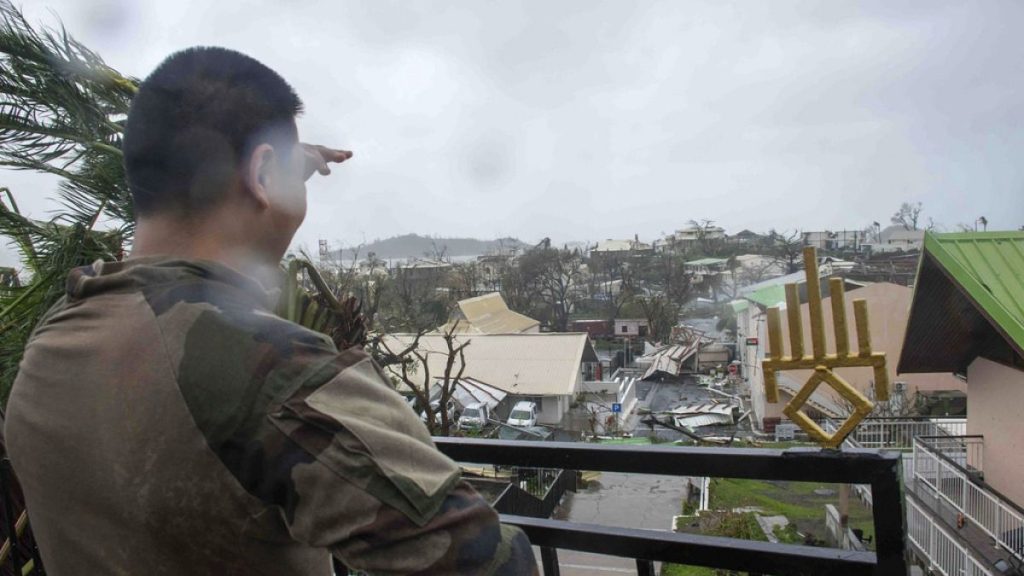The French island of Mayotte, located northwest of Madagascar, was tragically struck by Cyclone Chido on Saturday, resulting in the confirmed deaths of at least 14 people. French Interior Minister Bruno Retailleau expressed grave concerns that the final death toll could rise significantly as rescue and recovery efforts continue. This devastating cyclone, with its powerful winds and torrential rains, inflicted widespread damage across the island, leaving a trail of destruction in its wake. Mayotte, France’s poorest overseas territory, is home to approximately 350,000 residents, a majority of whom reside in precarious housing conditions, including tin shacks and other vulnerable structures ill-equipped to withstand the ferocity of a major storm. These fragile dwellings offered little protection against the cyclone’s force, exacerbating the impact of the disaster and contributing to the tragic loss of life.
The intensity of Cyclone Chido’s impact on Mayotte is deeply rooted in the island’s socio-economic vulnerabilities. As an overseas territory of France, Mayotte struggles with significant economic disparities compared to mainland France. This disparity manifests in the widespread presence of inadequate housing, with a large segment of the population living in structures susceptible to damage from extreme weather events. The cyclone’s destructive force exposed the pre-existing fragility of the island’s infrastructure and the precarious living conditions of its inhabitants, leaving them highly exposed to the dangers posed by natural disasters. The combination of poverty, inadequate housing, and a powerful cyclone created a perfect storm for devastation, highlighting the urgent need for improved infrastructure and disaster preparedness measures on the island.
The aftermath of Cyclone Chido has left Mayotte grappling with a humanitarian crisis. The immediate priorities include search and rescue operations for survivors trapped amidst the debris, providing medical assistance to the injured, and establishing temporary shelters for those displaced by the storm. The destruction of homes and infrastructure has left countless families without shelter, food, and clean water, creating an urgent need for humanitarian aid. International organizations and aid agencies are mobilizing resources to support the relief efforts, providing essential supplies and assistance to those affected by the disaster. The scale of destruction underscores the importance of international cooperation in responding to natural disasters and providing support to vulnerable communities.
The trajectory of Cyclone Chido, moving towards the coast of Mozambique, raises serious concerns about the potential for further devastation in the region. Mozambique, a nation already facing numerous challenges, including poverty and recurring natural disasters, is now bracing for the impact of the cyclone. Coastal communities are particularly vulnerable to the storm’s potential impact, with the risk of flooding, storm surges, and further loss of life. Authorities in Mozambique are taking precautionary measures, issuing warnings to residents and preparing evacuation plans to minimize the potential impact of the cyclone. The looming threat of Chido underscores the interconnectedness of weather systems and the potential for cascading disasters across regions.
The impact of Cyclone Chido on Mayotte serves as a stark reminder of the increasing vulnerability of island nations and coastal communities to the effects of climate change. Rising sea levels, more frequent and intense storms, and changing weather patterns pose significant threats to these areas. The destruction wrought by the cyclone highlights the urgent need for proactive measures to address climate change and build resilience in vulnerable communities. This includes investing in resilient infrastructure, developing effective early warning systems, and implementing sustainable development practices. The international community must work collaboratively to address the challenges posed by climate change and support vulnerable nations in adapting to its impacts.
The tragedy unfolding in Mayotte emphasizes the critical importance of disaster preparedness and the need for international cooperation in responding to natural disasters. The devastation caused by Cyclone Chido underscores the vulnerability of communities living in precarious conditions and the need for comprehensive strategies to mitigate the impacts of extreme weather events. The lessons learned from this disaster should inform future efforts to strengthen resilience in vulnerable regions and ensure that communities are better prepared to withstand the growing threat of climate change and its associated hazards. International solidarity and collaborative action are essential to address these global challenges and support vulnerable communities in facing the increasing risks posed by natural disasters.














